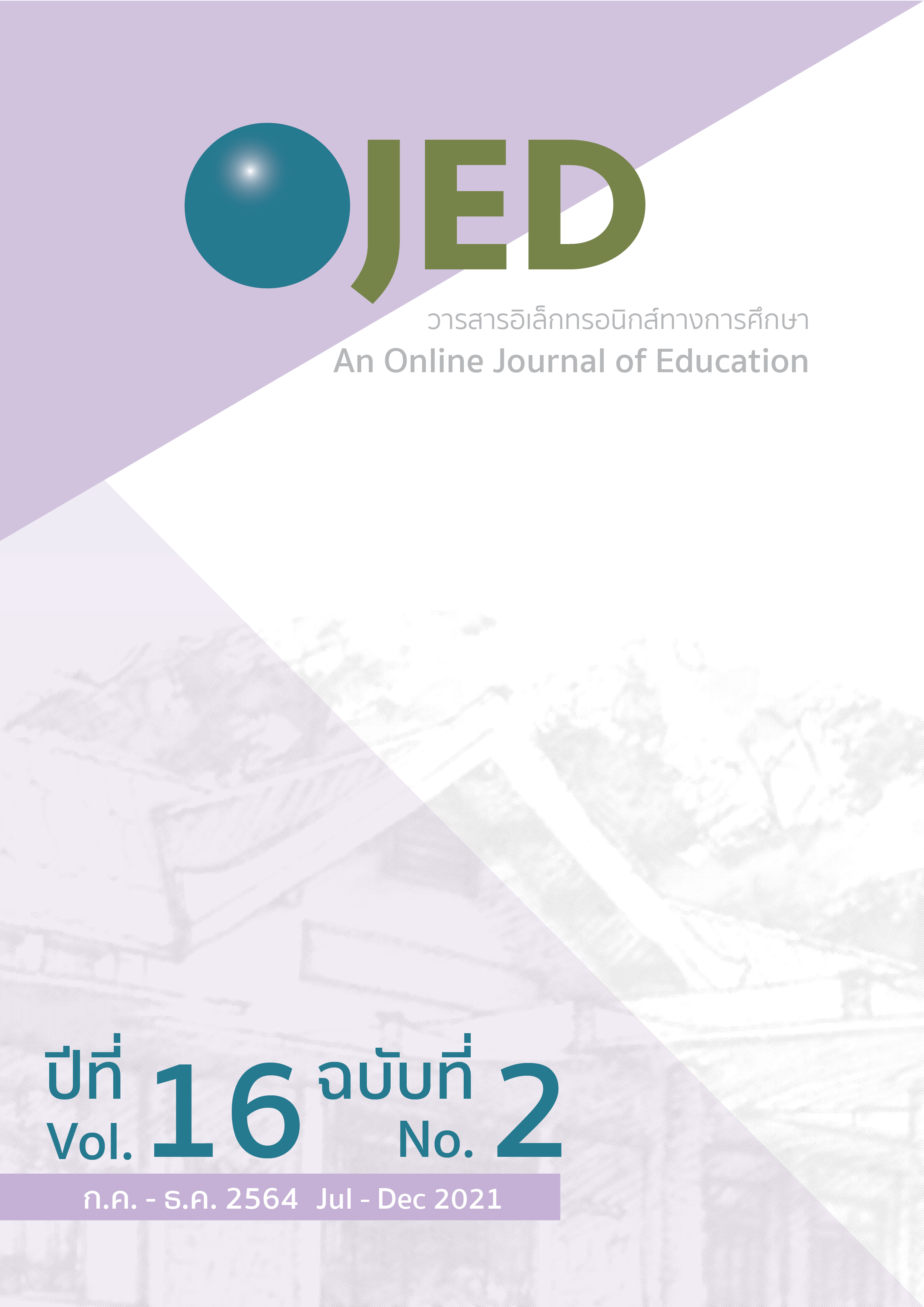Effects of Organizing Non-Formal Education Activities Based on Situated Learning Concept on English Communication Skills in Daily Life of Youths
DOI:
https://doi.org/10.14456/ojed.2021.42Keywords:
situated learning, English communication skills in daily life, non-formal education activities, youthsAbstract
The purposes of this study were to 1) develop non-formal education activities based on situated learning approach on English communication skills in daily life of youths, 2) study outcomes of organizing non-formal education activities based on situated learning approach on English communication skills in daily life of youths. This study based on the research design of a quasi-experiment using simple random sampling technique with one group pretest-posttest design. The research experimental group was 30 youths from ages 15-18 years old. Activities were organized for 7 days, totally 60 hours. The research instruments were the learning plan and activities plan and the instruments were questionnaires, satisfaction forms, and the English communication skills in daily life test. The data were analyzed by using means (M), standard deviation (SD), and dependent-samples t (t-test) at 0.05 level of significance. The research results were as follow: 1) The results of development activities found that consisted of four appropriate components as follows: meet the needs of learner, be consistent with English communication skills in daily life, focus on working in problem situations or virtual situations, focus on working in real situations. 2) After the experiment, the experimental group had the mean scores in the English communication skills in daily life test higher than before the experiment at 0.05 level of significance. 3) After the experiment, the experimental group had the mean scores in participants' satisfaction at the high level.
References
กรมวิชาการ, กระทรวงศึกษาธิการ. (2545). คู่มือการจัดการสาระการเรียนรูกลุ่มสาระการเรียนรู ภาษาต่างประเทศ ตามหลักสูตรการศึกษาขั้นพื้นฐาน พุทธศักราช 2544. องค์การรับส่งสินค้าและพัสดุภัณฑ์ (ร.ส.พ.).
กาญจนา จงอุตส่าห์. (2531). ระดับความสามารถด้านการพูดภาษาอังกฤษของนักเรียนระดับมัธยมศึกษาตอนต้น. จุฬาลงกรณ์มหาวิทยาลัย.
กฤษณา เมืองโคตร. (2553). การพัฒนาการเรียนรู้คำศัพท์ภาษาอังกฤษของนักเรียนชั้นประถมศึกษาปีที่ 4 โดยใช้รูปแบบการสอนภาษาเพื่อการสื่อสาร [วิทยานิพนธ์ปริญญาศึกษาศาสตรมหาบัณฑิต].มหาวิทยาลัยเชียงใหม่. Thai Digital Collection. http://archive.lib.cmu.ac.th/full/T/2553/edel0453km_abs.pdf
บุญธรรม กิจปรีดาบริสุทธิ์. (2531). การวิจัยและประเมินประสิทธิภาพทางการศึกษาของมหาวิทยาลัยมหิดล. สามเจริญพานิช.
เพลินตา พรหมบัวศรี. (2545). การพัฒนากระบวนการเรียนการสอนตามแนวคิดการเรียนรู้เชิงสถานการณ์เพื่อเสริมสร้างความสามารถทางวิชาชีพการพยาบาลของนักศึกษาพยาบาล [วิทยานิพนธ์ปริญญาครุศาสตรดุษฎีบัณฑิต]. จุฬาลงกรณ์มหาวิทยาลัย. Chulalongkorn University Intellectual Repository (CUIR). http://cuir.car.chula.ac.th/handle/123456789/277
ศูนย์วิจัยกสิกรไทย. (2555). การท่องเที่ยวเชิงสุขภาพอาเซียน. https://www.kasikornresearch.com /th/KEconAnalysis/Pages/ViewSummary.aspx?docid=29785
สุมาลี สังข์ศรี. (2545). การจัดการศึกษานอกระบบด้วยวิธีการศึกษาทางไกลเพื่อการศึกษาตลอดชีวิต. มหาวิทยาลัยสุโขทัยธรรมาธิราช.
สุนิดา ศิริพากย์. (2553). การพัฒนารูปแบบกิจกรรมการเรียนรู้ ภาษาอังกฤษตามทฤษฎีแรงจูงใจใฝ่สัมฤทธิ์ของเมคเคลแลนด์และการเสริมสร้างอัตมโนทัศน์ตามแนวคิดนีโอฮิวแมนนิส เพื่อพัฒนาผลสัมฤทธิ์ทางการเรียนวิชาภาษาอังกฤษให้กับนักศึกษาการศึกษานอกระบบ กลุ่มด้อยสัมฤทธิ์ที่เรียนด้วยวิธีทางไกล [วิทยานิพนธ์ปริญญาดุษฎีบัณฑิต]. จุฬาลงกรณ์มหาวิทยาลัย.
Chulalongkorn University Intellectual Repository (CUIR). http://cuir.car.chula.ac.th/handle/123456789/28806
อาชัญญา รัตนอุบล, รัตนา พุ่มไพศาล, เกียรติวรรณ อมาตยกุล, อรพินท์ วิบูลย์พันธุ์, วีระเทพ ปทุมเจริญ, วัฒนา, มนัสวาสน์ โกวิทยา, วรรัตน์ อภินันท์กูล, ณัฏฐลักษณ์ ศรีมีชัย, และ สุวิธิดา จรุงเกียรติกุล. (2542). แนวโน้มการจัดการศึกษานอกระบบโรงเรียนของประเทศไทยในทศวรรษหน้า. จุฬาลงกรณ์มหาวิทยาลัย. http://cuir.car.chula.ac.th/handle/123456789/8478
อุ่นตา นพคุณ. (2527). การเรียนการสอนผู้ใหญ่เพื่อพัฒนาทรัพยากรมนุษย์. กรุงสยามการพิมพ์.
Brown, J. S., Collins, A., & Duguid, P. (1989). Situated cognition and the culture of learning. Educational Research, 18(1). 32-42. https://doi.org/10.3102/0013189X018001032
Lave, J. & Wenger, E. (1991). Situated learning: Legitimate peripheral participation. Cambridge University.
Loring, R. (1998). Situated learning: Understanding contextual learning. National tech prep network.
McLellan, H. (1994). Virtual environments and situated learning. Multimedia Review, 2(3). 30-37.
Resnick, L. B. (1987). Learning in school and out. Educational Researcher, 16(9). 13-20, 54. https://doi.org/10.2307/1175725
Downloads
Published
How to Cite
Issue
Section
License

This work is licensed under a Creative Commons Attribution-NonCommercial-NoDerivatives 4.0 International License.




